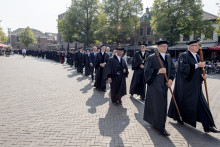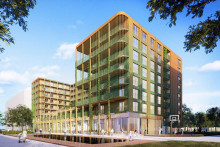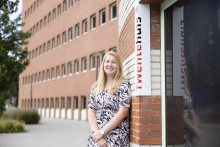For those entering the labour market, two aspects are important for settling somewhere in addition to green surroundings and an interesting job: cultural events and an attractive environment to live in. This is one of the conclusions in the report De Koers van Enschede, that was published in 2020 by Atlas Research on behalf of the same municipality.
The report shows that culture is a crucial element in a city's competitiveness. Cities that offer a wide range of cultural events are considered desirable places to live in. They typically attract highly educated and creative people. If these people also have access to attractive living arrangements and neighbourhoods, a city will have met the conditions for retaining talent. According to Van der Zouw, the municipality also bases its insights on studies conducted by, among others, other cities and housing corporations in Twente. 'We think it is important to keep young people within our city’s boundaries. The municipality endeavours to grow towards having 170,000 inhabitants. It is important that to keep all talent, both theoretically and practically trained, in our city.'
Retaining talent
But how does Enschede score on retaining talent? Which policy is in place to this aim? According to the Compendium for the Living Environment (facts and figures about living environment within the Netherlands), both the number of tertiary educated people and the percentage of highly-paid jobs in Enschede are relatively low in comparison with other university cities in border regions.
If we look at retaining international graduates in the Netherlands, Enschede performs poorly, according to Nuffic, the Dutch organisation for internationalisation in education. Of all internationals who are still working in the Netherlands five years after graduating (from all universities), fewer than two percent are located in Enschede. By comparison, 35 percent live and work in the Amsterdam area.

In 2018, the municipality of Enschede, together with UT’s University Innovation Fellows and Novel-T, conducted a survey among more than 450 students in order to map how students experience 'sticking around' in Enschede. The outcome showed that many respondents find the Twente region pleasant and accessible, but that the city of Enschede lacks a dynamic, international vibe.
Nightlife in Enschede was rated particularly low by the respondents, despite the substantial number of social activities that the city has to offer. Initiatives such as the Tankstation (a non-profit, artistic, cultural organisation) were welcomed because of the sense of community-building it provides and its international character. In general, the respondents felt that cultural events on offer in Enschede are limited and insufficiently connected to the international student community.
Policy on culture and events
'This is the reason for the municipality of Enschede to set out a policy on retaining students and graduates actively,' says Van der Zouw. 'As a municipality, we recently adopted a new culture and events policy. This is aimed to boost events organised in Enschede. In the new policy, we specifically pay attention to the new kids on the block in the cultural landscape and young artists. Organisations for young talent can apply for subsidies.’
In addition, we are working on providing a vital city centre through, for example, the Inner City Action Programme. Enschede is a student city, and the centre is a meeting place for students. The city needs to be a safe place for them, with a (more) diverse and distinctive range of shops and restaurants. Another suggestion is to create better and more accessible study places in the city centre, e.g. in the library or in other (public) buildings. A vibrant nightlife will help provide ample diversion and entertainment.'

The Action Programme advises students and youth organisations to draw up an agenda together with the city’s ‘Night Mayor’ to boost Enschede’s nightlife. Also, it recommends that more permits for nightly activities should be issued. Van der Zouw: 'In addition, in September the city council chose to set up a so-called Night Council that is to advise the municipality, both solicited and unsolicited, on issues relating to the city’s nightlife'.
Multilingual communication
In order to advance Enschede as an international city, the Action Programme states that multilingual communication is imperative in public spaces, but also in businesses and institutions in the city centre. Facilities should be attractive and accessible to international visitors: for example, this may include payment facilities for (international) credit cards, multilingual city maps and signs.
'We are working very hard to realise hundreds of new homes for young people and recent graduates in a highly urban environment, in the area around the station, within projects such as Centrumkwadraat and the Hengelo-Enschede railway zone,' says Van der Zouw. 'This entire area is transformed into a modern urban living and working area, with residential tower blocks that are explicitly intended for young professionals.'
For the construction of these homes, however, two cultural locations linked to the city’s nightlife had to make way. Disco 't Bölke ceased business after the Covid-19 crisis as it is, but the Underground Spacebar, part of Warp Technopolis, will also have to make way for a residential tower block. This seems to be at odds with fortifying Enschede’s nightlife. But according to Van der Zouw, most organisations that were in the demolished buildings have found new premises with the support of the municipality.
It is noteworthy that the prestigious ‘Kop Boulevard’ construction plan (that stretches from the MST hospital to the city centre) came to a standstill in 2022. This plan, that featured a budget of 150 million Euros, was aimed to surpass the Zuidas district of Amsterdam in quality. However, the plan did not get off the ground due to increased construction costs and stalled negotiations with the project developer. The only thing completed is a skate park, although the municipality is still making plans to develop this location further.
With a new policy on culture and events, housing intended for young people, and an action programme for the city centre, the municipality of Enschede is committed to retaining talent and young people within the city. 'We also keep an eye on offering good economics and a diverse range of work, housing and recreational options,' says Van der Zouw. 'These topics are spearhead issues of the municipality. The input of students and recent graduates is of vital importance and therefore always included.'
roots

This interview was previously published in career magazine ROOTS, a new initiative of U-Today. In this magazine we want to connect students and companies. We do this by bringing stories of starters on the labour market and by placing advertorials. In this way, companies come into the spotlight of students and students get an idea of the life that awaits them and what opportunities there are in the region.
Are you a recent graduate (<5 years), do you live and work in the region of Twente, Achterhoek or just across the border in Germany and do you want to share your story? Or do you want to advertise as a company? Let us know via [email protected]
roots
 The career magazine ROOTS has been made possible with financial support from the Province of Overijssel and Twente Board.
The career magazine ROOTS has been made possible with financial support from the Province of Overijssel and Twente Board.






